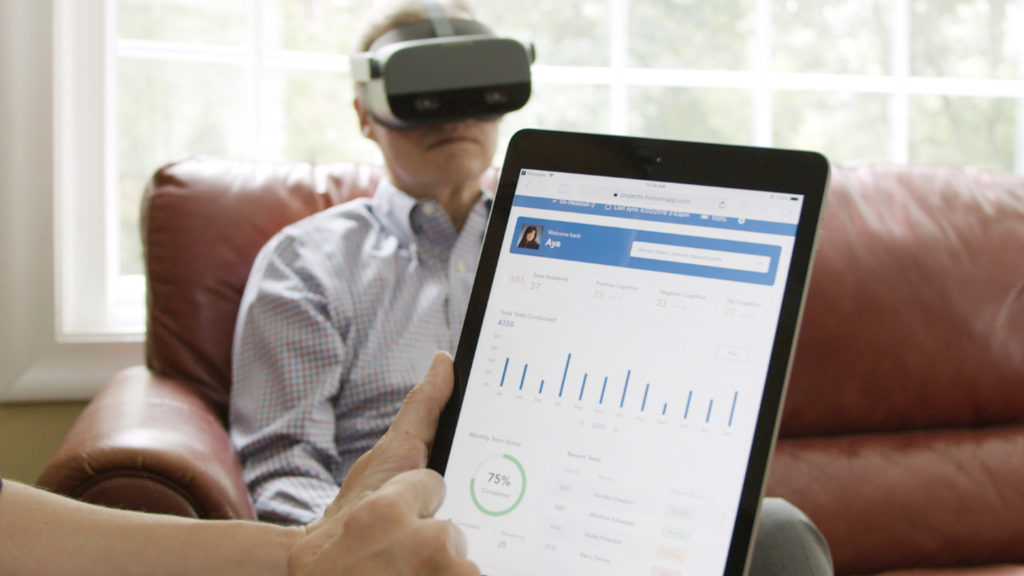
With the trifecta of a large information technology staff at its disposal, a philanthropic foundation and a forward-looking resident population, Asbury Communities is working to elevate technology in the care of older adults.
And it’s doing it through pilot programs aimed at contributing to preventive care research.
REACT Neuro pilot
Asbury Methodist Village in Gaithersburg, MD, is the only mid-Atlantic region testing partner for REACT Neuro, a program testing virtual reality technology for cognitive assessments.
REACT Neuro is being developed by a team of neuroscientists from the Cambridge Innovation Center and led by Rudy Tanzi, Ph.D., a Harvard University professor who discovered the first Alzheimer’s gene. Brain experts from Harvard Medical School and the Massachusetts General Hospital McCance Center for Brain Health also are participating.
During the 2021 REACT Neuro pilot, approximately 25 Asbury independent living residents used a virtual reality headset to take a seven-minute exam that monitors eye movement, changes in voice and changes in movement to measure executive function, attention and memory.
The virtual reality brain tool is part of the Kinnections Brain Health program, which is housed in Asbury Methodist Village’s Rosborough Brain Health Center for Excellence. Along with the REACT Neuro program, Kinnections Brain Health also includes cognitive assessments and personalized plans, fitness classes, SMARTfit exergaming, a nutrition program, Rock Steady boxing for Parkinson’s support and TRX strength training equipment.
Resident participants in the REACT Neuro pilot received a report of their results and can measure changes over time. As part of the pilot, residents contributed data that will create REACT’s “normal” brain function benchmarks. Eventually, the tool is expected to be used to identify early markers of neurological disease and develop treatment plans to support people with potential cognitive decline.
Asbury Methodist Village Director of Wellness Sue Paul told McKnight’s Senior Living that there were challenges with the pilot, which was launched “in the thick of COVID.”
“The protocols in getting 28 people on this program was a full-time job,” Paul said, adding that many residents had never seen VR goggles before. “Our most helpful contribution [to the research] was in giving language for instructions so older adults could understand what the VR was telling them to do and execute it in a completely unfamiliar environment.”
Paul said the learning curve was “immense, but fun,” adding that REACT Neuro took all of the feedback and used it to develop a final product that will be completely integrated into the community. Residents will be able to put on the VR goggles and follow the recorded instructions without much staff assistance. The idea is for residents to participate in the program once or twice a year to continue contributing to the data.
Phase two of the REACT program kicks off in April and includes headsets that were fine-tuned based on participants’ feedback. The upgraded goggles now are in use at Bethany Village in Mechanicsburg, PA, and at Asbury Methodist Village in Gaithersburg, MD; RiverWoods in Lewisburg, PA, soon will receive a set of goggles.
The goggles also will be used for virtual reality experiences, including virtual travel, lectures, concerts and socialization.
Asbury Foundation President JD Shuman told McKnight’s Senior Living that the creators of the REACT tool likened it to a “blood pressure cuff for the brain.”
“Before we had blood pressure cuffs, we didn’t know what good versus bad blood pressure was,” he said. “That’s what this is leading us to.”
Shuman said that philanthropy played a significant role in bringing the pilot to the community, as donor passions in technology fund solutions in shaping care for older adults.
“This is a beautiful example of the Asbury Foundation value proposition in action,” Shuman said. “We align donor passion with transformational opportunities. Asbury has already begun the process of elevating technology in care for older adults, and specifically the brain health world.”
COVID-19 prevention pilot
Asbury Methodist Village resident volunteers also are part of a Harvard University Brigham & Women’s Hospital study aiming to transform predictive data of COVID-19 onset into preventive care.
Asbury Communities’ IT services company, ThriveWell Tech, and Asbury partnered with Harvard at the beginning of the pandemic to test whether streaming data in senior living can be used to predict COVID-19 infection 72 hours before it occurs.
Leveraging data sets from Brigham & Women’s Hospital’s emergency medical record system for COVID-19 case data, they came up with predictive measures from temperature, heart rate and medications to forecast and detect early indicators of coronavirus. ThriveWell is refining the predictive algorithm and testing a COVID-sensing platform.
ThriveWell Tech President Nick Patel told McKnight’s Senior Living the idea was to use a biosensing device — a watch — to measure vital statistics combined with electronic medical records and medications. Assisted living residents will pilot the watch to see whether it can predict within the resident population who is susceptible or who has COVID-19.
“The challenge in senior living is that no one stores streaming data,” Patel said. “What we did was build an infrastructure to capture streaming data so senior living operators can store masses of streaming data to be analyzed.”
The pilot slowed due to the pandemic, but 30 assisted living residents are signed up for a feasibility study to see whether they will wear the watch and whether it functions properly. Paul said she hopes to launch the two-week feasibility study in the coming month.
“We are extremely excited with the potential this pilot will have to use advanced cloud platforms to generate, consume, organize and analyze resident data for targeted actions and outcomes that will benefit residents,” Patel said. “We’ve always been forward-looking, in terms of experimenting and learning more through pilots.”
The work is funded by the National Institutes of Health’s National Institute on Aging and is ongoing.




